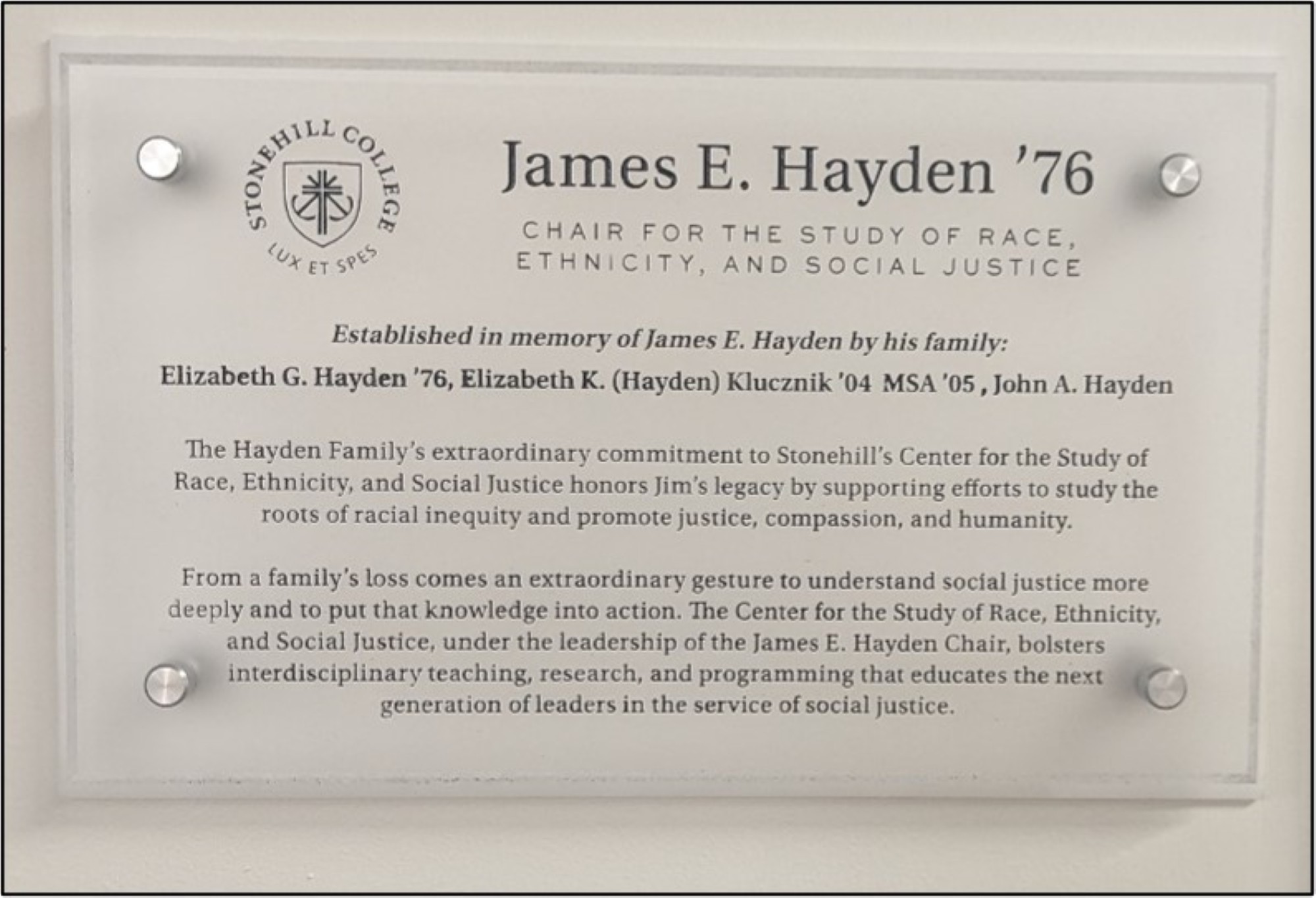2022-2023 Annual Report
The Center for the Study of Race, Ethnicity, and Social Justice
Academic Year 2022-2023
Annual Report
The Center for the Study of Race, Ethnicity, and Social Justice at Stonehill launched in Fall 2021 after nearly five years of planning and preparation. During the 2022-2023 academic year, we welcomed a wide swath of scholars and cultural producers discussing a wide range of topics ranging from environmental racism and Asian America to Black women’s activism and sports to health disparities in Black communities to history and whiteness. The Center played a vital role in various sorts of programming beyond just the five lectures that took place on campus. We also assembled our mission statement for the Center.
Presented in an in-person format, the programming of the Center for the Study of Race, Ethnicity, and Social Justice (CRES) was designed to complement the curriculum and foster student and faculty engagement in interdisciplinary studies of race, ethnicity, gender and sexuality studies, class, and social justice.

Over the course of the year, we had nearly 1,000 people attend CRES programs, including the Center’s inaugural donor, Liz Hayden, who joined us for several of our talks. The mix of events ranged from public-facing and student-facing to specific events structured to support faculty scholarly production. The major lectures were open to the public. As a result, in addition to the Stonehill College community, we had residents of Brockton, Easton, and Sharon attend our events.
CRES also fostered student-faculty collaboration and student creative accomplishments, sponsoring the Hayden Family SURE (Stonehill Undergraduate Research Experience) Scholar.

Dr. Stanley Thangaraj joined as the inaugural James E. Hayden Chair for the Study of Race, Ethnicity, and Social Justice in July 2022. He planned all the major lectures, workshops, and student-facing events on campus while playing a key role in issuing statements in support of justice.
Under Dr. Thangaraj’s continued leadership and guidance, CRES goals for the upcoming year include four lectures including the second Hayden Lecture, assembling another undergraduate conference, creating connections with Brockton for a “freedom school,” continuing with writing workshops and brown bag sessions for junior faculty, assembling major and minor courses of study in the Center, organizing an external advisory committee, and proceeding with the cluster hire of three faculty positions.
Steering Committee
The Center’s 2022-2023 academic year also took shape with the leadership of the steering committee of the Center. In addition to Stan Thangaraj, the members of the steering committee included faculty from across the college:
The Center sponsored five public lectures in 2022-2023, planned and organized by Dr. Stan Thangaraj, Grace Gibson ’22 (former CRES and Martin Institute Administrative Assistant), and students. The events also received $2,000 and $1,000 in supporting funds from the Office of DEI and the Athletic Department, respectively. We also co-sponsored the Office of Intercultural Affairs dinner event. The distinguished scholars and writers who visited campus represented a wide range of disciplines in the social sciences, humanities, sciences, and arts. The events were well attended by students, faculty, and staff, and residents of neighboring towns.
Dr. Dana-Ain Davis
Dr. David Roediger
Dr. Stan Thangaraj was initially given office space Meehan 101, but that was not a conducive space for meeting with students, faculty, and staff engaged in the work of the Center. May School of Arts & Sciences Dean Kevin Spicer worked with faculty and senior leadership to secure a larger space in May 234 as Dr. Thangaraj’s office and meeting location for the Center. Signage has been installed to promote both the location of the Center, as well as Dr. Thangaraj’s title of James E. Hayden ’76 Chair for the Center for the Study of Race, Ethnicity, and Social Justice.
With the help of Grace Gibson ’22, we were able to create a Spotify channel where students, faculty, and staff could upload their protest songs.
Grace Gibson ’22 was the administrative assistant for CRES for Fall 2022. She was an incredible resource and helped us with all the programming and most of the paperwork with regards to honorariums, booking rooms, and catering. She received a great offer for a paralegal job and the Center did not have an administrative assistant for Spring 2023. It was difficult running the Center without such help. May School Dean Kevin Spicer has provided the Center with Erin Dzierzak as the permanent Administrative Assistant starting in Summer 2023. Ms. Dzierzak will be a critical administrative resource in supporting the logistical needs of the Center as programs and speaking engagements continue to be central to CRES offerings.
The first statement issued by CRES to the campus community was issued condemning the Iranian state violence and the attack on protesters demanding justice in Iran after the morality police’s killing of a Kurdish Iranian woman, Jina Mahsa Amini. The second statement was issued condemning on-going police attacks and killing of Black communities. In particular, the statement was issued with relation to the killing of a young Black man, Tyre Nichols, in Memphis, Tennessee.
Leah Tabor '25
Brian Traves '25
Provost Peter Ubertaccio and May School of Arts & Sciences Dean Kevin Spicer approved the cluster hire for the Center for the Study of Race, Ethnicity, and Social Justice. The steering committee of the Center met to go over the proposals initially before writing to senior administration with the proposals that fit the mission and aims of the Center. Three of the proposals were chosen and approved by senior administration.
Starting in Fall 2023, Stonehill College will run three positions as part of the cluster hire into the Center. Each of the hires will have a home department, while also teaching for the Center. The Center will provide key mentorship and intellectual guidance, as well as professional infrastructures of support for the new hires.
The Department of Sociology and Anthropology will run a position on race and health disparities. There will be special interest with scholars looking at African American, Latinx, and indigenous communities over issues of health disparities, health outcomes, toxicity, and women of color and indigenous feminism. This position will be a key space to engage with science and technology studies while interrogating the impact of medical institutions on the health of minoritized communities.
The Department of English will run a position on post-colonialism and Black literary works. There will be a special interest with looking at Black literary works broadly across the Atlantic and in North America with an engagement with gender and sexuality studies. This position is vital to looking at the relationships between race and language while providing a very key reading practice in the service of justice.
The final position that is part of the cluster hire will be with the Department of Political Science. There will be interest in looking at American politics and race, with a focus on African-American, Latinx, and indigenous communities. We will be especially interested in candidates who look at social movements and legislation in relation to race and racism. This will provide a macro-level analysis of race and the political system in the United States of America.
The Center for the Study of Race, Ethnicity, and Social Justice launched in fall 2021 as a new home for innovative and interdisciplinary teaching, research, and public dialogue at Stonehill College.
Thank you for making a gift in support of the Center for the Study of Race, Ethnicity, and Social Justice.